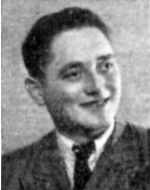Fisher, Matityahu (Matti)
Son of-Rachel and Issachar-Yehuda was born on September 10, 1927, in the town of Petrovo-Salo, in northern Yugoslavia, in a community that was one of the few islands of traditional-rooted Judaism among the other Jewish communities in the former southern part of Hungary . Matityahu studied in the elementary school of the community and later in Yeshivah, and during his spare time was involved in running the family estate. The Jews of the town liked him as a Torah-minded, smart, practical, and pleasant man with his people. When the Germans invaded Yugoslavia in 1941 and returned the area to Hungary, the Hungarian authorities tightened their hand on the Jews and their sources of livelihood. In 1944 he was deported with the family and all the Jews of the town to the Auschwitz extermination camp, and after they took his mother to the kiln, he was shackled from camp to camp in Germany. At the time of his discharge by the American army, he weighed about 30 kilograms, was held in a hospital for a few months and then joined a training group of the Torah v’Avodah movement, where he organized a group of 48 members and taught Hebrew lessons, Talmud and general studies. From his family he went to his town and found his four sisters, one of whom was willing to cross with him the dangers of the Bericha route to Italy, and again joined the camp of his movement and was active in the organization and culture, And when the British caught the ship, he hoisted the national flag, Shah At the Atlit camp, he joined the “Hagshama” group and after the liberation went with her to join Tekuma, which was then in Kfar Haroeh. Matityahu quickly adapted to the new conditions of life, and a month later spoke fluent Hebrew and from the beginning of his arrival was an active member of Hapoel Hamizrahi and Hagana. For family reasons, he left his group and moved to Netanya, struggling hard with no work until he got along at work in the building. Moved to Pardes Katz and then to Bnei Brak and settled in his new profession and his free hours devoted to Torah study and general studies and to the recognition of the land and its problems. During the War of Independence he was drafted into the “People’s Guard” on February 1, 1948, and was sent to a combat unit in the Alexandroni Brigade. He took part in the occupation of the Tel Litvinsky camp (Tel Hashomer), Hiriya, Sakia, Salameh, Kakun, Tantura, and in the Golan Heights, , Kula, Igzim, Jaba and Lod, and at the beginning of winter his unit was transferred to the south, during Operation Horev, a “liquidation operation” was carried out against the “Faluja pocket.” The attack took place on the eastern flank of the ” And the Alexandroni forces attacked Iraq al-Manshiyya, and the force succeeded in conquering part of the village, but the attack on the mound of its conscience was repulsed. Out of concern for the soldiers, who did not manage to reach the concentration of the platoon before deploying to break out, he asked permission from the platoon commander to stay in order to gather the other men and break in with them, and indeed they managed to break through. On December 28, 1948, and asked his men to take the rest of the wounded and he would return on his own, but did not return. He was buried in Faluja. After a while he was put to rest at the military cemetery in Nahalat Yitzhak.
